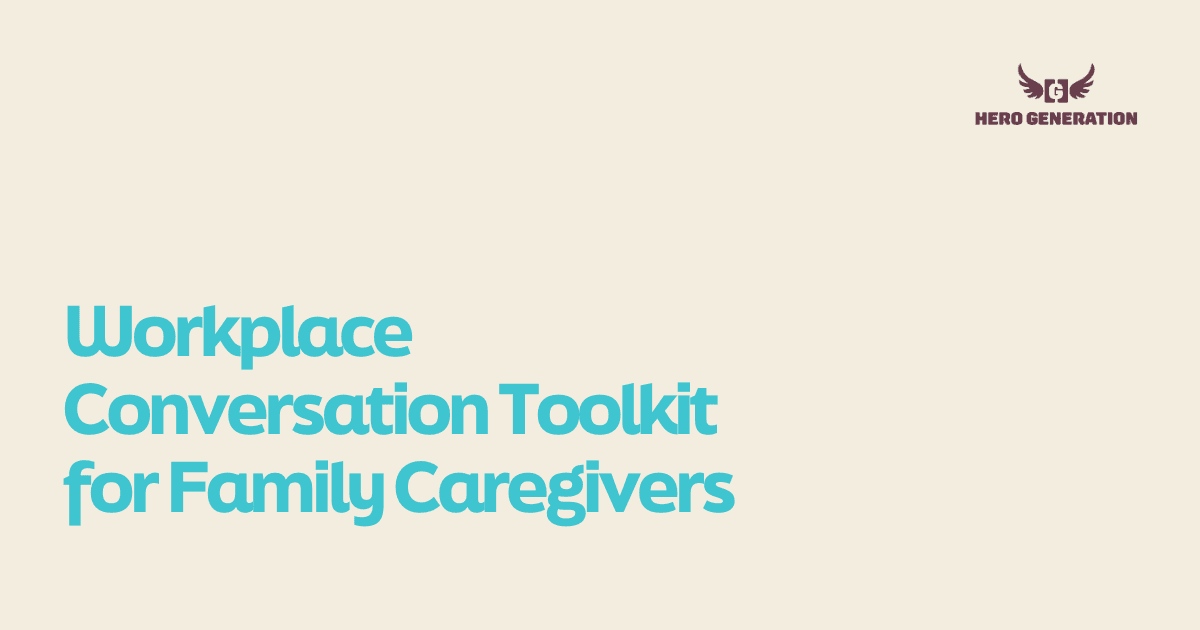Workplace Conversation Toolkit for Family Caregivers
Many caregivers hesitate to talk with their employers about their caregiving role. But the right conversation can open the door to flexible arrangements, reduced stress, and stronger workplace support. Here are strategies, sample scripts, and tips to help you prepare.

HeroGeneration
Published on August 26, 2025•Updated on August 27, 2025

Many caregivers hesitate to talk with their employers about their caregiving role. But the right conversation can open the door to flexible arrangements, reduced stress, and stronger workplace support.
Here are strategies, sample scripts, and tips to help you prepare.
1. Before the Conversation: Get Prepared
Know your rights: Research FMLA, state paid leave laws, and employer-specific policies.
Clarify your needs: Decide what specific accommodations would help (flexible start time, remote work, compressed schedule, reduced travel, job-sharing).
Gather documentation: While you don’t need to disclose medical details, being able to explain your time commitments (appointments, care needs) builds credibility. Show your HeroGeneration calendar or to-do list!
Frame the benefit: Be ready to explain how workplace flexibility will also help you maintain productivity and commitment.
2. Script Ideas: With Your Supervisor
Option A: Starting the Conversation
“I want to share something important. I’m a caregiver for [my parent/spouse/child], and it sometimes impacts my schedule. I want to stay fully committed to my role here, so I’d like to talk about ways to balance my work and caregiving more effectively.”
Option B: Requesting Flexibility
“I’ve been managing caregiving responsibilities alongside work, and it occasionally requires me to adjust my hours. Would it be possible to explore options like [flexible hours/remote work on certain days] so I can stay consistent and productive here?”
Option C: Suggesting a Trial Period
“To make sure this works for everyone, could we try [adjustment] for a month and then check in to see if it’s effective? I’m confident it will help me stay on top of both work and caregiving.”
3. Script Ideas: With HR
Option A: Policy Inquiry
“I’m a caregiver for a family member, and I’d like to understand what benefits are available. Does our company offer flexible work arrangements, caregiver leave, or access to employee support programs?”
Option B: Formalizing Arrangements
“I’ve been speaking with my supervisor about caregiving needs, and I want to make sure we’re aligned with HR policies. Could you help me navigate what documentation is required and what options are available?”
Option C: Confidential Support
“I’d like to keep my caregiving role private within my team, but I want HR to be aware in case I need support. Can you guide me on how to manage this discreetly?”
4. Tips for a Successful Conversation
✅ Choose your timing wisely – avoid stressful deadlines or high-pressure days. ✅ Stay solutions-focused – frame requests as ways to stay productive, not as burdens. ✅ Keep it professional – share caregiving responsibilities without oversharing medical details. ✅ Propose specifics – it’s easier for supervisors to approve concrete solutions. ✅ Follow up in writing – confirm agreements via email for clarity.
5. If You Face Pushback
Ask about alternatives: “If remote work isn’t possible, could we explore adjusted start times or compressed schedules?”
Involve HR if needed — they’re often more aware of legal requirements and company policies.
Connect with HeroGeneration or local caregiver advocacy groups for additional guidance.
Caregivers are the backbone of families and communities, but they’re also a critical part of the workforce. By advocating for workplace support, caregivers can protect their own well-being and help employers recognize the value of a supported workforce.
👉 HeroGeneration provides ready-to-use scripts, worksheets, and advocacy resources to help you approach these conversations with confidence. Visit herogen.co to explore more family caregiver tools.

